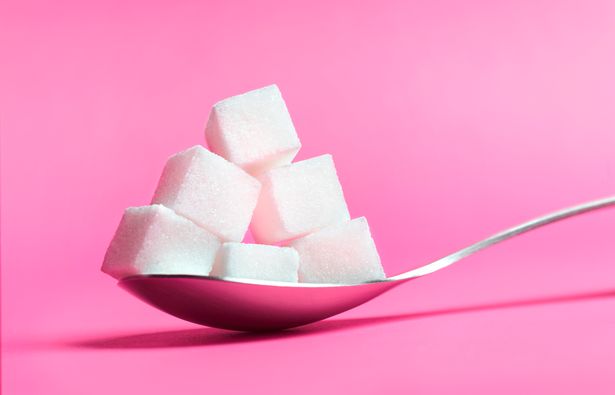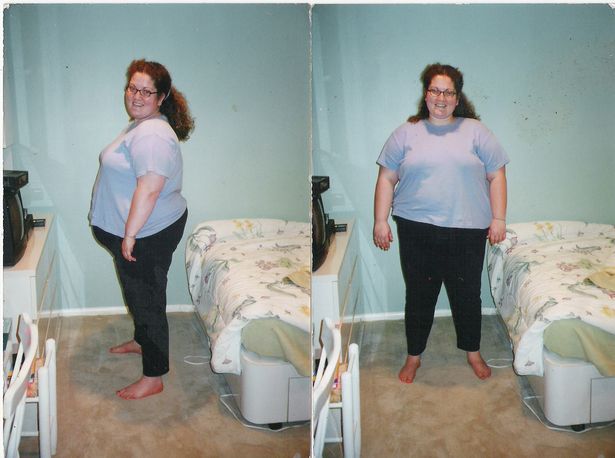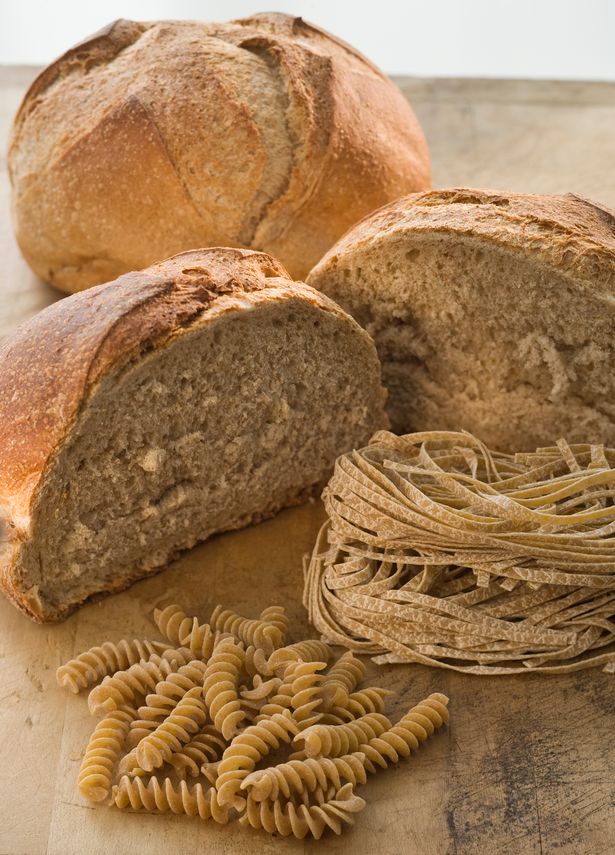After decades of bingeing on sweet treats and failed yo-yo diets, weight loss expert Molly Carmel finally discovered the secret to transforming her relationship with food for ever.
Sugar addiction comes in all shapes and sizes – and in all bodies.
If you find yourself deep into a box of doughnuts when you’ve sworn to yourself you wouldn’t, then you probably have a problem with sugar.
If you’re in the kitchen at night finishing off a loaf of bread, hoping no one wakes up to hear you, you are probably in an abusive relationship with sugar.
If you are successful in many parts of your life yet cannot succeed at eating sugar in moderation, then you know how it feels to be addicted to the stuff.

I know how much pain, shame, isolation and suffering this relationship with sugar can cause .
I battled my food and weight disorder – tipping the scales at 23st – for more than 20 years.
Being morbidly obese and unknowingly trapped in an abusive relationship with sugar is a pain I wouldn’t wish upon my worst enemy.
But I was able to piece together a recovery and find a way to create the help I needed.


I amassed degrees, researched and went beyond the traditional fields of psychology, addiction and nutrition to open the doors to my Manhattan clinic, the Beacon, back in 2012.
Thousands of clients later, I’ve never looked back.
Today, my relationship with food is everything I hoped it would be.
How to stay on track without sweet stuff
Surf your cravings
Sugar cravings can be overwhelming. However, they are episodic, not constant, and they rarely last more than 30 minutes. Ride out the cravings and take back control. Research shows that when we eat the foods we crave less frequently, our cravings for that food decrease.
Meditate
Meditation is one of the single most important practices you can adopt to protect your new relationship with food. It helps regulate behaviour and emotions, and reduces stress.
Find your joy
When you experience joy, connection and laughter, your brain releases dopamine, serotonin and endorphins, chemicals that enhance your feelings of pleasure and block feelings of stress and pain.
Detoxing doesn’t last
If you’re feeling tired, sad,
irritable or have headaches, muscle aches, an upset stomach or sleep problems, you’re experiencing sugar detox. Physical withdrawal from sugar can last from two days to two weeks.
Avoid cheat days
Cheat days are a slippery slope that will lead you right back into the arms of sugar. Very rarely do planned cheat days last just a day and if they do, the damage done is enough for a week.

I am incredibly satisfied with the food I put into my body, maintaining a healthy weight naturally.
I feel zero shame about food and I live a full, busy, and generally awesome life.
If you too are struggling with sugar, remember that our relationship with the sweet stuff has taken a nasty turn.
Today, processed food is made with highly concentrated sugar and minimal amounts of fibre and protein, activating the brain’s reward pathways with a new intensity and magnitude.
Your new food rules
1 Fat is your friend
While sugar cues our brain to keep eating and not feel the effects of fullness, fat actually sends the proper “stop” message to the brain. But be mindful.
If you’re eating processed
foods that contain fat and sugar, they may trigger your urge to eat more.
2Carbs are on the menu
It’s not about no carbs,
it’s about slow carbs. Carbohydrates including fruit, vegetables, nuts and whole grains are digested and absorbed more slowly, so they keep you satisfied for longer.
3 Have fun
with fruit
Fruit is rich in fibre, which helps to slow the absorption of sugar
into your bloodstream, helping you avoid
blood-sugar spikes. However, some fruits, such as bananas, grapes, and pineapple have higher concentrations of sugar, which might then set off some
serious cravings.
4 Don’t eat after dinner
After-dinner snacks can quickly become the foot in the door for a night of eating and a morning of shame. Eating at night supports the idea that you need food after dinner. That’s simply not true.
5 Cut calorie counting
Not all calories are created equal. But different foods affect our metabolism and digestion differently, not to mention our hormones ghrelin and leptin, which control our feelings of hunger and fullness. Sugar increases your appetite and encourages the body to store weight but protein increases feelings of fullness and promotes weight loss.

It’s also hidden in bottled and packaged foods such as peanut butter, salad dressing and sauces. In the UK, sugar intake per capita has more than doubled since 1950 and with that, the obesity rate has quadrupled.
We know it impacts our looks causing weight gain, breakouts, wrinkles and tooth decay.
But sugar has also been linked to inflammation, migraineheadaches , anxiety, brain fog, trouble sleeping, gum disease, heart disease, non-alcoholic fatty liver and diabetes.
There’s even terrifying research showing that sugar increases the risk of developing certain cancers.
Your no-sugar vows
I vow to be free of artificial sweeteners
Studies show that artificial sweeteners can raise the body mass index (BMI).
This is because sweeteners trick the brain into thinking we need more sugar, causing us to overeat.
I vow to be free of drinking my calories
Scratch the health benefits of juice cleanses, coconut water and smoothies. Without the fibre of fruit and vegetables in their whole form to slow the sugars down, your insulin will spike and send your blood sugar crashing. And limit your booze intake to two units a week of
sugar-free alcohol such as gin, vodka and whiskey, mixed with no-calorie mixers like soda water.
I vow to be refined
flour free
When you eat flour, your body reacts to it as if it is sugar, causing quick blood-sugar and insulin spikes. And flour, just like sugar, is hiding in almost everything. Some people can handle almond or chickpea flour, while others find they leave them wanting even more.
I vow to be mindful of my volume
Start to weigh exact portions.
Eating large volumes of food can be habitual, soothing and comforting. Environmental factors and triggers –
TV in the background, supersized containers and large portion sizes – also cause us to underestimate exactly how much we’re eating.
I vow to eat every
3 to 4.5 hours
People who struggle with their weight snack frequently, eat large portions, binge-eat and miss meals. Don’t let more than 4.5 hours go by between any meal or snack, ensuring you limit urges to binge, overeat, or undereat. It’s easier to avoid sugar when you feel satisfied and know when your next meal is.
I vow to be a planner
Plan what you are eating, when you are eating, your meals when you dine out and your snacks and meals when you’re on the go. Think ahead to when you’re going to the supermarket and exactly what you’re going to buy there. Plan your online orders and when you will prepare your food for the week.
I vow to weigh myself in a loving way
Weight loss is an outcome, not a goal. Decide to weigh yourself at predetermined times, either twice monthly (on the first and 15th of the month) or on the first of the month.
Don’t deviate from this schedule, especially if you’re feeling thin or fat.
The point of
this vow is to ensure that you’re moving in a direction toward optimal physical health.
But I’m going to help end your unhealthy relationship with sugar with my unique meal plan, recipes and self-care tips.
Follow my plan for 66 days – the length of time it takes for new behaviour to become automatic – starting with a series of promises to yourself. I’m so proud that you’re making this important next step. I’m with you all the way.
How to read ingredients
Ingredients in packaged foods are listed in descending order.
First come the ingredients that are present in the highest quantities, and then gradually down to the ingredients with the lowest quantities.
If sugar, flour, or any of the words that mean sugar and flour (words that end in -ose, such as glucose, dextrose, fructose, or starch) are listed in the first four ingredients, don’t eat that food.
If sugar or flour are listed as the fifth ingredient or later, the food is good to go.
Breaking Up with Sugar by Molly Carmel (£14.99, Yellow Kite) is out now.
